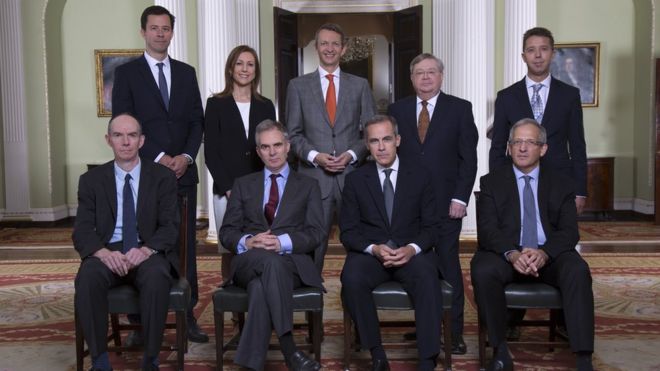A nine-strong committee look pretty similar: eight white men and white woman. This is the body that guides Britain’s economy and that is suppose to represent the diverse community the UK now represents.
Their monthly votes on interest rates ultimately determine how far our money goes.
Yet they don’t look anything like the people whose lives they have so much influence over, why is that? Its because the Bank of England has a Diversity Problem
The UK population is made up of different ethnicities. 87% of people are White, and 13% belong to a Black, Asian, Mixed or Other ethnic group and Women make up half of the UK population. Astoundingly 0% of the Monetary Policy Committee belong to a Black, Asian, Mixed or other ethnic groups and women make up one ninth of the committee. Shocking!
Mark Carney current governor is in fact, the 120th in a continuous line of white men to have headed the Bank.
It’s plain obvious the Bank has a diversity problem. But this is not a isolated issue as many other organisations in Britain have this very same problem.
The Public Accounts Committee (PAC) said last month that the Bank was some way off its diversity targets for next year “with little evidence the gap is closing quickly enough”.
Joanna Place the Bank’s chief operating officer also said: “In terms of diversity and inclusion, we have done a lot more than just gender and ethnicity.
“We have a number of staff networks. We have inclusive events. We have a wellbeing policy. We have done a cognitive diversity survey. We have started to look at social mobility,” she added.
Unfair
The Bank’s search for a new governor kicked off earlier this week and many are hoping that this could herald the start of a new era with a black governor at the helm for the first time in its history. However, Wendy Carlin, a professor of economics at University College London, says the problem is not with the Bank of England, but the economics profession itself.
Minorities quit Bank of England as it fails on diversity
More troubling were the committee findings into the proportion of BAME employees at the organisation, with an increase of just 3 per cent between 2015 (15 per cent) and 2018 (18 per cent), and no increase between 2017 and 2018.
Just 5 per cent of employees working at senior management level came from a BAME background in 2018. This is not a coincidence.
Ethnic minority employees are leaving the Bank of England in disproportionate numbers and feel less comfortable with the organisation’s culture, according to internal research.
The Bank’s non-executive directors admitted that the “BAME [black, Asian and minority ethnic] resignation rate was above that for the Bank as a whole” and said that it was actively addressing the problem, according to minutes of a recent meeting. But that’s not enough.
Statistics already show that BAME workers in UK are third more likely to be underemployed — report and probibly less likely to study economics, let alone get a job in the sector. TUC says study highlights a waste of black, Asian and minority ethnic talent and urges more effort to tackle discrimination at work
“We know this is part of a much bigger story. BAME workers are more likely to be unemployed, paid less, and aren’t getting enough of the top jobs. Employers and the government cannot afford to ignore these problems. They must now take real action to tackle underemployment and pay discrimination.”
The former business secretary Sajid Javid had called on businesses to do more to support the careers of black and minority ethnic (BME) workers and commissioned Ruby McGregor-Smith, the chief executive of the facilities management company Mitie, to undertake an independent review of BAME progression at work. The review is due to report by the end of this year.
Dr Heffernan says the profession itself should try to make sure it is attracting the widest possible pool of applicants.
“How you word a job will define someone’s right to apply. If you’re not getting the right kind of applicants then describe the job differently and see what happens.”
Christian’s can help
If the Church put more effort into actively encouraging its members to work in professions that would benefit greatly from a strong moral compass, and then support them in those roles, just think what benefit to our country there might be.
Facts about the The Monetary Policy Committee (MPC)
The Monetary Policy Committee (MPC) is made up of nine members — the Governor, the three Deputy Governors for Monetary Policy, Financial Stability and Markets and Banking, our Chief Economist and four external members appointed directly by the Chancellor.
External members are appointed to make sure that the MPC benefits from thinking and expertise from outside of the Bank of England. A representative from HM Treasury also sits with the MPC at its meetings. The Treasury representative can discuss policy issues, but is not allowed to vote. They are there to make sure that the MPC is fully briefed on fiscal policy developments and other aspects of the Government’s economic policies, and that the Chancellor is kept fully informed about monetary policy.
Each member of the MPC has expertise in the field of economics and monetary policy. Members do not represent individual groups or areas — they are independent.
MPC members serve fixed terms, after which they may be either replaced or reappointed.
The PAC has called on the bank to provide a report setting out the additional steps it will take to ensure it meets its diversity targets by June 2019.
Godinterest’s Manifesto of Ethics
To promote freedom of religion — Violations of religious freedom are increasing globally in scale, depth and blatancy. Carried out by both government and non-state actors, they range from the mundane to the extreme (e.g. genocide).
To promote freedom of expression and internet freedom — Freedom of expression is an essential part of a properly functioning democracy and a free society. People should be free to express themselves both online and offline. But in many parts of the world freedom of expression is under threat.
To be a inclusive social network — We aim to share multiple voices and perspectives. We prohibit and will remove Offensive material that has been reported to contain (e.g., Pornographic material, hate speech, encouraging violence against others, etc)
To respect one’s right to remain anonymous — Our users place their trust in us to keep them safe, and, in some cases, anonymous. We view safeguarding that trust and protecting our users’ private information as vital to what we do.






